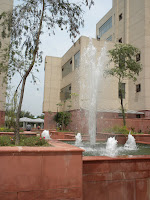 The National Law University in Delhi is the last of the national law schools we are visiting and the newest. The physical plant is still being constructed. The campus is beautiful -- these photos give some idea -- and is connected to central Delhi by the new metro.
The National Law University in Delhi is the last of the national law schools we are visiting and the newest. The physical plant is still being constructed. The campus is beautiful -- these photos give some idea -- and is connected to central Delhi by the new metro.
The school is phasing in its program, in fact its third entering class was welcomed just this week. When the program is fully operating NLU will have 5 "batches" of students working toward the first law degree as well as LLM and PhD students. Because we were there on the first day of class, there was no opportunity to give a formal lecture as I had done at the other schools. However, the Constitutional History professor graciously gave me and Bob about 20 minutes of class time to talk about public interest law and to answer questions. The students asked great questions, including why the U.S. does not join international environmental protection efforts such as those directed at limiting greenhouse gasses.




